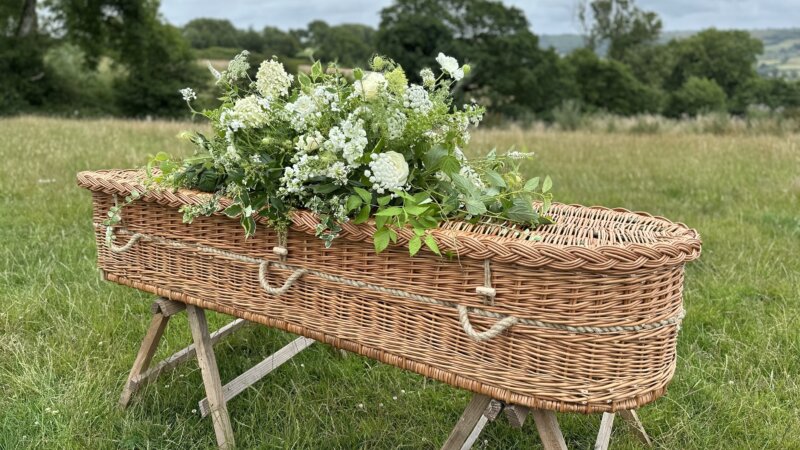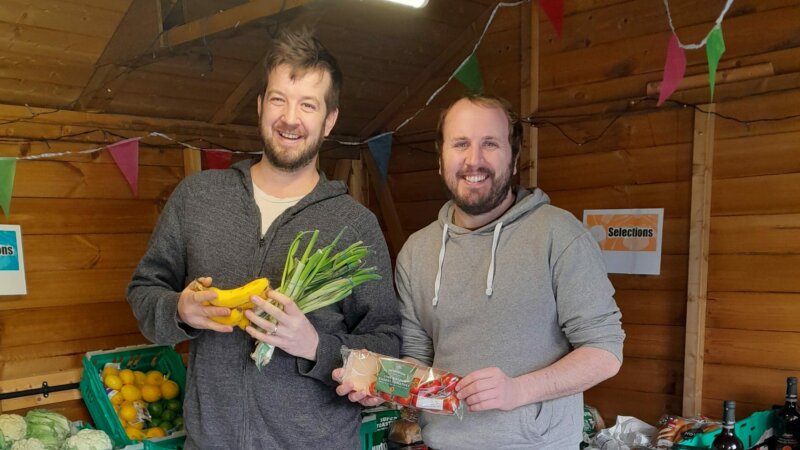Dr Patrick Harding: Botany, Fungi and Foraging
On first meeting Patrick Harding, what is most evident is that above all, he is a local man with a wealth of knowledge and utter enthusiasm for what he does. Patrick is all about science and bringing it to the people. For the last two decades, he has lectured at the University of Sheffield and organised the science programme for the Institute of Continuing Education at the University of Cambridge.
Although perhaps best known for his expertise in fungi, Patrick's knowledge goes far beyond mushrooms. As a botanist, Patrick manages to demystify fact from fiction. As a creative, he incorporates poetry, prose and visuals into what many see as the hard-faced member of the academic disciplines. With over 30 years teaching the power of plants, Patrick's career is still thriving and his passion is obvious in every word he speaks.
All too often natural remedies get dismissed in favour of western medicine, with labels like 'alternative', 'holistic' or even 'quackery'. Why do you think this is?
Using plants as medicine is certainly not new. We have good evidence indicating that our ancestors were using a range of medicinal plants as far back as 60,000 years ago. The problem these days is that too often 'new' is deemed better than 'old', as many women television presenters have found to their cost.
A very large number of herbal remedies have been shown to be efficacious. In the last 100 years we have learned a great deal about the chemicals present in plants and the way such materials affect the human body. Despite this there is still a tendency among part of the scientific community to label herbal medicine as 'alternative' (I prefer the term 'complementary') and lump it along with unproven practices such as crystal therapy. The fact that many herbalists use a holistic approach should be viewed in a positive light. The treatment of disease is not simply negating symptoms, as any good GP will readily admit.
In Sheffield we're blessed with an abundance of green space and natural woodland, but we still can't shake off that label of being the City of Steel. Do you think more local people should embrace their surroundings? Why do you think people tend not to utilise what's around them?
Just as the use of plants in medicine has moved forward, as evidenced by the current use of plant-based chemicals (e.g. vinblastin from Madagascar Periwinkle and taxol from Yew) by the NHS in the treatment of a range of cancers, so Sheffield has moved with the times. Steel is still manufactured here, but the Steel City image of smoke and grime is as outdated as the view that plant-based medicine is outmoded.
Surprisingly, Sheffield's woodland heritage is tied up with its manufacturing past. Wood was needed as an industrial fuel, especially for charcoal before the invention of coke, and birch twigs were used in large quantities in the process of rolling steel, so our woods were not cut down but carefully managed to give a continuous supply of woodbased products.
Despite being aware of the medicinal properties of many of the wild plants to be found within the city, I do not advocate self-medication for all. Our hospitals are busy enough without having to admit people who have misidentified a plant or overdosed with a medicinal plant. A small amount of the chemical found in foxglove leaves can help certain heart problems, but a larger amount can kill. Much of medicine is about dosage.
The way that more people in Sheffield can embrace their surroundings is through eating more locally grown plant products. The waiting lists for allotments are evidence of the change in attitudes in the last ten years. At the same time initiatives in Sheffield have seen the collection of fruit from gardens where it was previously left to rot, and events in places such as Heeley City Farm, Tideswell School of Food and Fischer's Hotel teach people about foraging safely for edible plants and wild mushrooms.
What would you say was the beginning of your love of plants?
My mother not only obtained a first class honours degree in Biology, but went on to obtain a doctorate from Cambridge University, a rare event for women in the 1930s. As a child I learnt the names of wild flowers from her, whilst also developing an interest in birds and photography from my father, but this was only after we returned from Egypt, where I had spent my childhood. I saw few plants and most of the trees were date palms, but the Suez Crisis of 1955 brought us home to a much greener land and the consummation of my love affair with plants. Two botany-based degrees, eight books and a lifetime of enthusing people of all ages about plants and fungi has ensured that my interest is far from diminished.
It's well documented that Downing Street have opposed the idea of decriminalising the use and possession of 'soft drugs' like cannabis, but it has some benefits and it is legal in some parts of the world. What is your view?
The polarisation of views about herbal medicine is nothing compared with the stances taken in Britain over the use of cannabis. The original definition of the word 'drug' is 'dried plant material', and until the early part of the 20th Century most British doctors relied on plant-based drugs including cannabis. Queen Victoria was regularly prescribed 'Indian Hemp' - the name given to cannabis in those days - to treat her period pains and other "women's problems". Sadly, in the rush to ban something else in the USA after the end of Prohibition, cannabis fell foul of the law and Britain followed poodle-like and not only banned the recreational use of the drug, but also research into possible new medicinal uses.
It took a famous Sheffield-based, dog-loving MP to help redress the balance. Not only was cannabis reclassified as a less serious recreational drug, but more importantly permission was given for research and development of new cannabis-based drugs. Already some of these have been approved for use by the NHS and more are in the pipeline - a real step forward. However, conventional medicine has continued to use the analgesic properties of morphine and this does not mean that the recreational use of morphine-based drugs including heroin is to be condoned.
As to the decriminalisation of the recreational use of cannabis, I have mixed feelings. There is too much recent scientific study that points to the long-term effects of modern skunk, a far cry from the far less potent product I knew in the 60s. What I do know is that our drug laws are not working and I find it sad that so many ex-politicians, ex-chiefs of police and retired judges have spoken out against our failing policy, but few have had the courage to do so when in office.
What are the benefits of foraging? What can people expect to stumble across in Sheffield?
There are plenty of good edible plants. During spring and early summer the fresh growth of species such as Ramsons (wild garlic), Jack by the Hedge and Chickweed add flavour and texture to salads and other dishes. Spring fungi such as Morels (increasing in Sheffield gardens on wood chip) and St George's Mushrooms (any time from 23rd April) lead us on into the summer fruits, including wild raspberries and the wonderful bilberries in the surrounding moorlands. All this precedes the cornucopia of edible autumn fungi. The benefits? Free food, plenty of exercise and a return to the huntergatherer existence. Most important is the knowledge that I know what I am eating. There is no hidden horse meat in my foraged food.
tideswellschooloffood.co.uk
patrickharding.co.uk )





